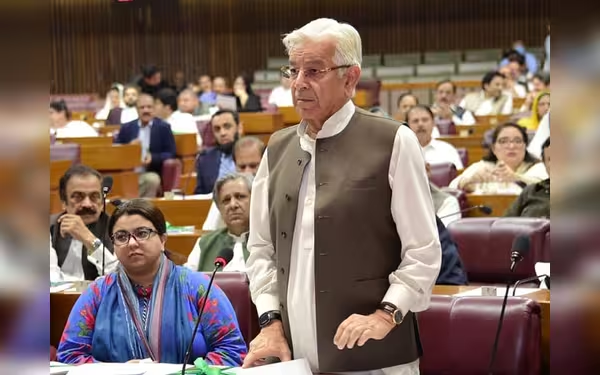Saturday, November 16, 2024 03:16 PM
Khawaja Asif Questions Imran Khan's Compliance with Establishment
- Khawaja Asif criticizes Imran Khan's rally postponement.
- Questions arise about political leaders' independence.
- Asif targets Ali Amin Gandapur's lengthy stay at Kohsar Complex.
 Image Credits: tribune.com.pk
Image Credits: tribune.com.pkKhawaja Asif questions Imran Khan's compliance with the establishment over rally postponement, raising concerns about political independence in Pakistan.
In recent political developments in Pakistan, Defence Minister Khawaja Asif has raised eyebrows regarding the actions of Imran Khan, the founder of the Pakistan Tehreek-e-Insaf (PTI) party. Asif's comments come in light of Khan's quick agreement to postpone a rally, which he claims was requested by the establishment. This situation has sparked discussions about the relationship between political leaders and the military establishment in Pakistan, a topic that has long been a point of contention in the country.
Khawaja Asif did not hold back in his criticism, questioning why Imran Khan was so eager to comply with what he termed as the establishment's request. This raises important questions about the autonomy of political leaders in Pakistan and whether they are truly independent or beholden to external influences. Asif's remarks suggest that he believes Khan's actions reflect a lack of political strength and independence.
Furthermore, Asif took aim at Khyber-Pakhtunkhwa Chief Minister Ali Amin Gandapur, who reportedly spent seven hours at the Kohsar Complex. Asif implied that Gandapur's lengthy stay was voluntary, indicating that he was not coerced into being there. This statement seems to highlight a broader narrative about the willingness of certain political figures to align themselves with the establishment, whether by choice or by pressure.
The implications of these comments are significant. They not only reflect the ongoing power dynamics within Pakistan's political landscape but also serve as a reminder of the challenges faced by leaders who navigate the complex relationship with the military. As the political climate continues to evolve, it remains to be seen how these dynamics will affect future rallies, political strategies, and the overall governance of the country.
The exchange between Khawaja Asif and Imran Khan underscores the intricate web of politics in Pakistan. It raises critical questions about leadership, independence, and the influence of the establishment on political decisions. As citizens observe these developments, it is essential to consider the broader implications for democracy and governance in Pakistan. The ongoing dialogue about these issues will undoubtedly shape the future of the nation and its political landscape.













